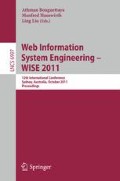Abstract
Self-organisation provides a suitable paradigm for developing autonomic web-based applications, e.g., e-commerce. Towards this end, in this paper, a composite self-organisation mechanism in an agent network is proposed. Based on self-organisation principles, this mechanism enables agents to dynamically adapt relations with other agents, i.e., change the underlying network structure, to achieve efficient task allocation. The proposed mechanism integrates a trust model to assist agents in reasoning with whom to adapt relations and employs a multi-agent Q-learning algorithm for agents to learn how to adapt relations. Moreover, in this mechanism, it is considered that the agents are connected by weighted relations, instead of crisp relations.
Access this chapter
Tax calculation will be finalised at checkout
Purchases are for personal use only
Preview
Unable to display preview. Download preview PDF.
References
DeWolf, T., Holvoet, T.: Towards autonomic computing: agent-based modelling, dynamical systems analysis, and decentralised control. In: The First Intern. Workshop on Auton. Comput. Princip. and Archit., Banff, Canda, pp. 10–20 (2003)
Gomes, E.R., Kowalczyk, R.: Dynamic analysis of multiage nt q-learning with e-greedy exploration. In: ICML 2009, Montreal, Canada, pp. 369–376 (June 2009)
Griffiths, N., Luck, M.: Changing neighbours: Improving tag-based cooperation. In: AAMAS 2010, Toronto, Canada, pp. 249–256 (May 2010)
Hermoso, R., Billhardt, H., Ossowski, S.: Role evolution in open mas as an infor- mation source for turst. In: AAMAS 2010, Canada, pp. 217–224 (May 2010)
Kaelbling, L.P., Littman, M.L., Moore, A.W.: Reinforcement learning: A survey. Journal of Artificial Intelligence Research 4, 237–285 (1996)
Kota, R., Gibbins, N., Jennings, N.R.: Self-organising agent organisations. In: AAMAS 2009, Budapest, Hungary, pp. 797–804 (May 2009)
Mathieu, P., Routier, J.C., Secq, Y.: Principles for dynamic multi-agent organizations. In: Kuwabara, K., Lee, J. (eds.) PRIMA 2002. LNCS (LNAI), vol. 2413, pp. 109–122. Springer, Heidelberg (2002)
Serugendo, G.D.M., Gleizes, M.P., K., A.: Self-organization in multi-agent systems. The Knowl. Engin. Review 20(2), 165–189 (2005)
Smarandache, F., Dezert, J.: Advances and Applications of DSmT for information Fusion. America Research (2004)
Author information
Authors and Affiliations
Editor information
Editors and Affiliations
Rights and permissions
Copyright information
© 2011 Springer-Verlag Berlin Heidelberg
About this paper
Cite this paper
Ye, D., Zhang, M., Bai, Q. (2011). A Composite Self-organisation Mechanism in an Agent Network. In: Bouguettaya, A., Hauswirth, M., Liu, L. (eds) Web Information System Engineering – WISE 2011. WISE 2011. Lecture Notes in Computer Science, vol 6997. Springer, Berlin, Heidelberg. https://doi.org/10.1007/978-3-642-24434-6_19
Download citation
DOI: https://doi.org/10.1007/978-3-642-24434-6_19
Publisher Name: Springer, Berlin, Heidelberg
Print ISBN: 978-3-642-24433-9
Online ISBN: 978-3-642-24434-6
eBook Packages: Computer ScienceComputer Science (R0)

